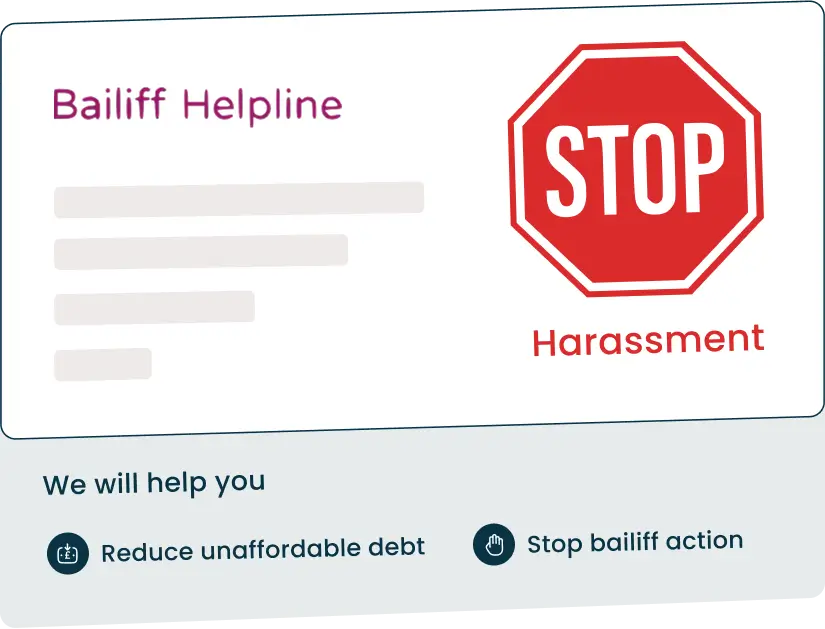Stop Bailiff Action
Looking to stop bailiffs from taking action? Facing bailiff enforcement can be frightening, but you don’t have to face it alone. At Bailiff Helpline, our experts have helped thousands regain control with discreet, compassionate support. We specialise in helping people stop bailiff action quickly and effectively, guiding you every step of the way.
If you’re wondering how to stop bailiffs before they visit, clamp your vehicle, or remove belongings, getting the right advice early can make all the difference. Bailiffs must follow strict rules, and understanding your rights can help you prevent enforcement from escalating. Whether you’ve received a Notice of Enforcement or bailiffs have already attended your property, we can help you explore practical solutions designed to stop bailiffs and protect what matters most.

Take these essential steps to stop bailiffs
Do NOT
Let Them In
You are not obligated to let anyone into your home. Don’t feel pressured.
DO NOT
be intimidated
You do not have to speak to the bailiffs and do not respond to intimidation.
DO NOT
sign anything
Never sign anything a Bailiff puts in front of you. Signing could affect your rights.
Contact
Bailiff Helpline
We can STOP Bailiffs and help you Write Off unaffordable debts through an IVA.
Stop Bailiffs
Frequently Asked Questions
- Can I stop bailiffs?
Yes. You can often stop bailiff action by paying the debt in full, or if that’s not possible, by arranging an affordable repayment plan or entering a formal debt solution such as an IVA. Acting quickly is vital, once a plan is agreed, bailiffs are usually required to pause enforcement.
If you’re unsure how to stop bailiffs, getting advice early can prevent visits, additional fees, and the risk of goods being taken. In some cases, creditors may even recall the debt from bailiffs if you engage and propose a realistic solution. Understanding your rights and responding promptly gives you the best chance of stopping enforcement before it escalates further.
- Can I stop bailiffs from coming into my house?
Yes. Bailiffs can’t usually force their way in and must provide you with at least 7 days’ notice before they visit. They may only enter through an unlocked door or if you invite them inside. They cannot break down your door except in rare cases like unpaid criminal fines or tax. Keeping doors locked helps stop bailiffs from entering.
- What happens if I have let the bailiffs into my home?
If bailiffs enter and you can’t pay in full, you’ll usually need to sign a controlled goods agreement. This means your belongings are listed under their control but remain in your home while you make repayments. If the terms of the agreement are broken, the bailiff can return and take the listed items to recover the debt.
- Can I stop bailiffs from taking my car?
Bailiffs may take vehicles, but not if your car is on finance, essential for work, or worth under £1,350 when used for your job. If your car is at risk, move it to a secure location away from your property until you’ve arranged an affordable solution.
- How to stop Bristow and Sutor bailiffs?
Bristow and Sutor bailiffs often collect council tax and similar debts. We’ve successfully helped people stop their enforcement before by arranging affordable solutions and preventing further action. You can find out more on how to stop Bristow & Sutor bailiffs here.
- How to stop Marston bailiffs?
Marston bailiffs enforce court orders, fines, and other debts. We’ve supported many people in stopping Marston’s enforcement through repayment plans and debt solutions. You can find out more on how to stop Marston bailiffs here.
- What times can bailiffs visit?
In England and Wales, bailiffs can usually only visit between 6 am and 9 pm. They must use the front door and cannot enter through windows. Visits outside these hours are only allowed in rare circumstances, such as for business premises or collecting unpaid criminal fines.
- Can a Debt Relief Order stop bailiffs?
Yes, a Debt Relief Order (DRO) can stop bailiffs if the debt they are collecting is included in the order. Once a DRO is approved, creditors must pause enforcement action, and bailiffs should no longer visit or attempt to take goods. However, this protection only applies to qualifying debts, so getting advice early can help ensure the DRO covers your situation and stops further bailiff action.
- How do I stop bailiffs for Council Tax?
You can often stop council tax bailiffs by acting quickly and engaging with the council or the enforcement company as soon as possible. Paying the balance in full will immediately stop action, but if that isn’t affordable, you may be able to arrange a realistic repayment plan. In some cases, the council may take the debt back from bailiffs if you show a willingness to pay. Formal debt solutions, depending on your circumstances, can also pause enforcement. Getting advice early helps you understand your rights, reduce added fees, and prevent further visits or the risk of goods being taken.
- How do I stop bailiffs from taking my things?
The best way to stop bailiffs from taking your belongings is to act quickly as soon as you receive notice of enforcement. Paying the debt will immediately halt further action, but if that isn’t possible, you may be able to agree an affordable repayment plan. For most debts, bailiffs cannot force entry on their first visit, so keeping doors locked can help protect items inside your home. It’s also important to know that essential household goods, work tools within value limits, and items belonging to others are usually protected. Seeking advice early can help you understand your rights, challenge unlawful action, and explore solutions that stop enforcement before goods are removed.
What our clients say
Take Action Before Bailiffs Do
Ignoring Bailiffs can lead to further enforcement action. The sooner you act, the more options you have.
- Call Now: 0161 820 1298
- Speak With Experienced Advisors
- 100% Confidential Advice










